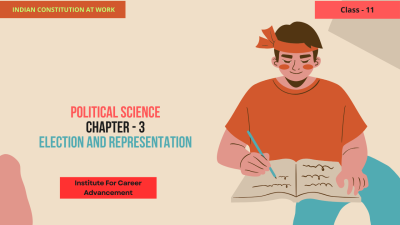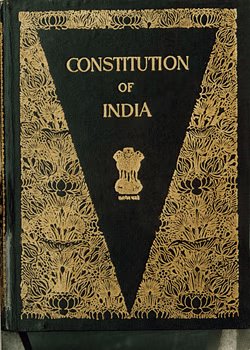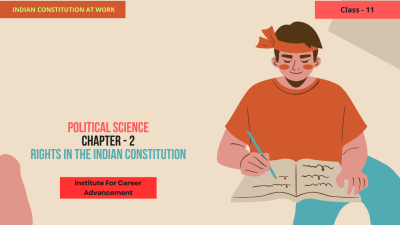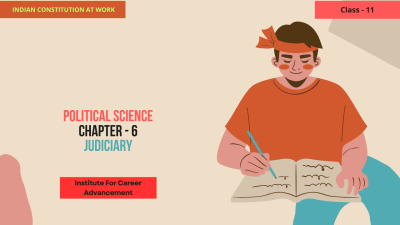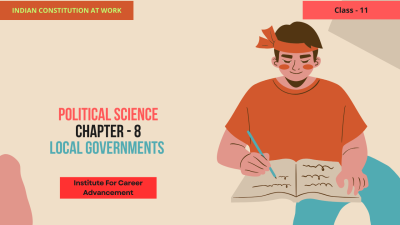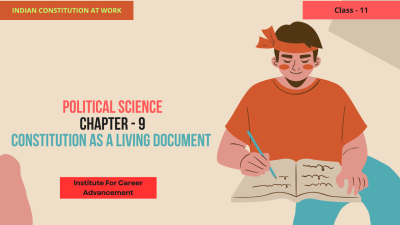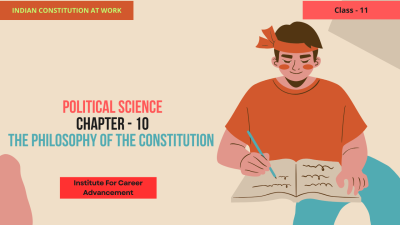Election and Representation - Class 11
Election and Representation is a Class 11 chapter that likely explores the principles and processes of elections and representation in a democratic system. It might delve into topics such as: Electoral Systems: Different electoral systems, including first-past-the-post, proportional representation, and mixed systems. Voting Rights and Eligibility: The criteria for voting eligibility, including citizenship, age, and other requirements. The Electoral Process: The steps involved in conducting elections, from voter registration and campaigning to polling day and counting ballots. Representation: The concept of representation, including the different types of representatives (elected, appointed, and nominated) and the responsibilities of elected representatives. Challenges and Issues: The challenges and issues associated with elections, such as voter turnout, electoral fraud, and gerrymandering. Overall, this chapter likely provides a comprehensive overview of the principles and practices of elections and representation in a democratic system, helping students understand the importance of participation in the political process. নির্বাচন ও প্রতিনিধিত্ব হল একাদশ শ্রেণীর একটি অধ্যায় যা সম্ভবত একটি গণতান্ত্রিক ব্যবস্থায় নির্বাচন ও প্রতিনিধিত্বের নীতি ও প্রক্রিয়াগুলি অন্বেষণ করে। এটি নিম্নলিখিত বিষয়গুলি নিয়ে আলোচনা করতে পারেঃ নির্বাচনী ব্যবস্থাঃ প্রথম-অতীত-পরবর্তী, আনুপাতিক প্রতিনিধিত্ব এবং মিশ্র ব্যবস্থা সহ বিভিন্ন নির্বাচনী ব্যবস্থা। ভোটদানের অধিকার এবং যোগ্যতাঃ নাগরিকত্ব, বয়স এবং অন্যান্য প্রয়োজনীয়তা সহ ভোটদানের যোগ্যতার মানদণ্ড। নির্বাচনী প্রক্রিয়াঃ ভোটার নিবন্ধন এবং প্রচারণা থেকে শুরু করে ভোটের দিন এবং ব্যালট গণনা পর্যন্ত নির্বাচন পরিচালনার সাথে জড়িত পদক্ষেপ। প্রতিনিধিত্বঃ বিভিন্ন ধরনের প্রতিনিধি (নির্বাচিত, নিযুক্ত এবং মনোনীত) এবং নির্বাচিত প্রতিনিধিদের দায়িত্ব সহ প্রতিনিধিত্বের ধারণা। সমস্যা ও সমস্যাঃ নির্বাচনের সাথে সম্পর্কিত চ্যালেঞ্জ এবং বিষয়গুলি, যেমন ভোটারদের উপস্থিতি, নির্বাচনী জালিয়াতি এবং গেরিম্যান্ডারিং। সামগ্রিকভাবে, এই অধ্যায়টি সম্ভবত নির্বাচনের নীতি ও অনুশীলন এবং গণতান্ত্রিক ব্যবস্থায় প্রতিনিধিত্বের একটি বিস্তৃত পর্যালোচনা প্রদান করে, যা শিক্ষার্থীদের রাজনৈতিক প্রক্রিয়ায় অংশগ্রহণের গুরুত্ব বুঝতে সহায়তা করে।
English
Last updated
Wed, 27-Nov-2024

